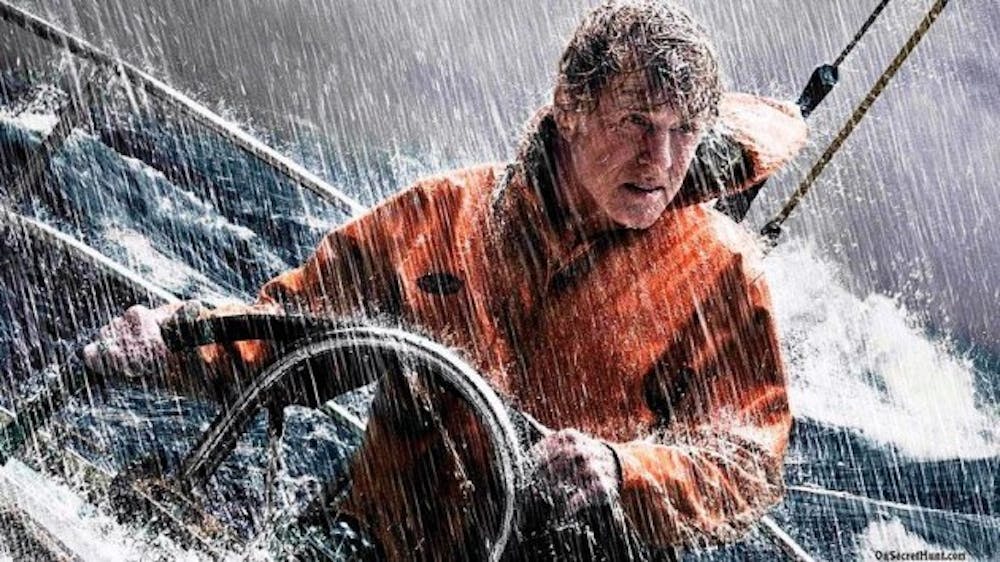Film: All Is Lost
Studio: Lionsgate
Buffalo Release Date: Nov. 8
Grade: B
On Friday, All Is Lost came to Buffalo. When it premiered out of competition at the Cannes Film Festival last May, it left its audience mystified; in no way did they expect what was coming. At age 77, Robert Redford ("The Sundance Kid" who established The Sundance Film Festival) provides a performance with greater courage and vulnerability than we've ever seen before in his over half-century of acting.
Starring in "an existential horror story about trying to survive the worst moment of your life," as Maureen Dowd of The New York Times put it, Redford (The Company You Keep) is a nameless yachtsman sailing the Indian Ocean when suddenly, as he is sleeping, a floating steel-shipping container clobbers his boat and puts a hole in its side. After a prologue in which the protagonist (credited as "Our Man") shares a letter he has written, probably to his family, the film then returns to eight days earlier - with the aged sailor awakened in his cabin to a shipwreck.
What ensues is a virtually wordless film: 100 minutes of meticulous attention to the material and emotional details of trying to survive in a battered ship at sea - with stormy weather and every kind of adversity.
Written and directed by J.C. Chandor (Margin Call), the script is a mere 31 pages with no dialogue. Some utterances take place, but the film is mostly what Alfred Hitchcock called "pure cinema" - everything is said to the spectator visually. And it is a one-man show; there is only one character in the entire film.
Rarely do films give us completely isolated figures - solitary characters generally have someone or something to talk to (think of Wilson the volleyball in Cast Away), but All Is Lost bears a sense of intimacy appropriate to its subject - man's confrontation with his own mortality.
Redford has the anxiety in his eyes, the tightening of his face, the quivering of his jaw, which carry a level of authenticity only an actor like he could bring - as he may meditate on the same confrontation when he steps out of character.
When he steps in character, however, there is a big transformation. Redford, the actor we all feel we know, plays a character we know nothing about. Never does Chandor provide any explanation regarding Our Man's history; we don't what he's doing at sea or even why he's there.
Following in the literary footsteps of Ernest Hemingway's The Old Man and the Sea (about a lonely fisherman's survival and ontological struggle with God), Chandor embraces making his work so completely cinematic that its comparison to such a work lies only on a continuum.
When Our Man's navigation equipment is damaged and rendered unusable early on, we're thrust into the domain of allegory. There are spiritual analogies that dominate the symbolic imagery of each shot, and innumerable invocations regarding the language of nature that pervade the film's visual language - fused with a sense of speculation of how God speaks (or doesn't) through nature.
Our Man's journey reemphasizes what philosophical inquiry has long arrived at: that you have to be lost to be found.
As high-minded as this film tends to be at times, it is a clean and intelligent work of craftsmanship. Through its aroma of ambiguity and uncertainty, it gives itself an honesty that comes from not answering many of the questions it poses.
The one question it tries to answer is certainly its biggest - embedded in its existentialism and metaphysical speculation is the query of individual meaning.
'What is the meaning of life?' is the ultimate pseudo-philosophical question - life is too various and complex to maintain that there is one meaning to it. But All Is Lost suggests that how you live your life will ultimately answer that question.
For Our Man, it has to do with never quitting on your life.
Within all the allegorical undercurrents implanted in the man vs. nature plotline of the film - the omnipresence of water, the cyclical life of the storm - there is perhaps even more grandeur in the story, which is really about man vs. himself.
email: arts@ubspectrum.com





